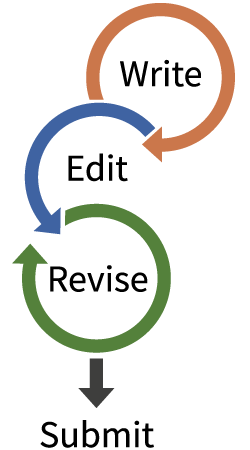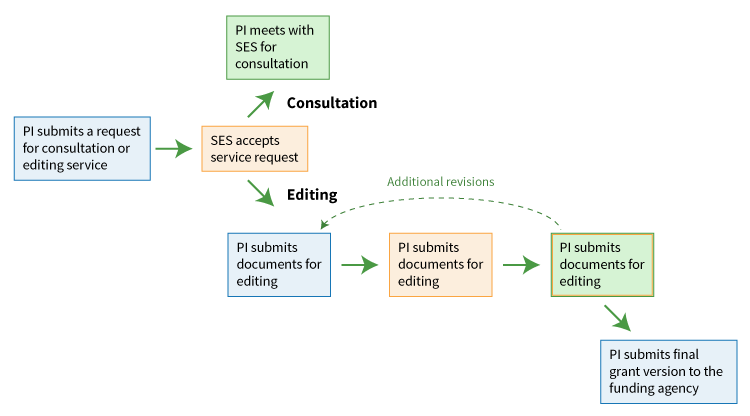The Scientific Editing Service (SES) works with ICTS members to strengthen and clarify their extramural grant applications and manuscripts. Experienced scientific editors customize their services to meet the specific needs of your documents. The service is jointly supported by the ICTS and the Washington University Department of Medicine.

The SES can help:
- correct grammatical and typographical errors
- improve sentence structure, paragraph organization, and flow
- strengthen the scientific significance and impact
- enhance scientific specificity
- identify inconsistencies
- improve formatting and headings
- reduce word count
- refine the language
There may be a waiting list during periods of high demand. When we begin working on your document, the editing will take two weeks or less in most cases. Editing improves grant applications / manuscripts, but does not guarantee funding / publication.
Prioritization
We triage editing requests. Grant proposals always have priority over manuscripts. Priority is given to applicants who:
- have a record of previous engagement with ICTS programs and resources
- are early career track investigators moving toward independent investigator careers
- are faculty within the Department of Medicine
Early engagement with the SES improves your priority and enables sufficient time for optimum development of your grant application or manuscript.
The Scientific Editing Service is available to all ICTS members regardless of career stage or partner affiliation. Priority is given to individuals with previous engagement with ICTS programs and resources, early stage investigators moving toward independent investigator careers, and faculty in the WUSM Department of Medicine. Grant proposals always have priority over manuscripts. Register Now if you are not an ICTS member.
Complete the Service Request Form for a consultation with one of the scientific editors or for requesting editing for your grant application or manuscript.
After submitting the Service Request Form, the SES will respond within three working days and provide a Job Number that must be used in all subsequent correspondence. Use your Job Number to complete the Document Submission Form.

The Scientific Editing Services identifies and develops various tools, templates and resources to help investigators writing extramural grants. The material in this segment provides convenient access to a few of these resources and templates.
Tips for Working with SES
- Engage early (ideally 6-8 weeks before the deadline)
Start working on your grant application ~6 months before the deadline - Read the grant application instructions carefully
Be sure to include all required grant application components - Consult the resources provided in “Strategies to obtain NIH funding”
Using these tools and guidelines will improve the quality of your application - Solicit and incorporate any feedback (e.g., RF presentation, NIH Mock SS)
The SES can help you address feedback and integrate changes - Indicate any specific issues you would like addressed
Special issues should be discussed before editing starts - Leave time for multiple revisions/exchanges with the SES
Don’t wait until the last minute to finalize the suggested changes
Strategies to Get NIH Funding
- Begin working on your grant application approximately 6 months before the deadline.
Create a schedule so that you have plenty of time to carefully write and revise your application. Formulate your hypotheses and experimental approaches at least 5-6 months before the grant deadline. Talk with your mentor and colleagues to get their input and feedback. Begin writing your Specific Aims page at least 4-5 months before the grant deadline. Begin writing your Biosketch and Career Development Plan at least 3-4 months before the deadline. Rewrite and improve your Specific Aims page at least once or twice, and then send it to SES for at least one edit. - Carefully read the grant instructions and understand the priorities of the funding NIH institute.
Incorporate the language used in the FOA or IC mission statement into your proposal. Ensure that your application adheres to the correct formatting requirements specified in the call (e.g., font size and page limits), and that it includes all required sections. - Contact your Program Officer and review the Study Section roster.
Send an email to your Program Officer to ask if they would read your Specific Aims page and give you feedback. The Program Officer can provide guidance on how to improve your application for their mechanism, or whether a different mechanism would be more appropriate for your application. Study Section rosters list the standing members of a Study Section, and can give you a good idea of who will be reviewing your grant. Include diplomatic citations to their work, if appropriate. - Revise your Specific Aims page based on the Program Officer’s feedback.
Rewrite and improve your Specific Aims page based on the Program Officer’s advice. Incorporate any continuing feedback from your mentor and colleagues. - Expand your Specific Aims page into the Research Strategy.
A well-written Specific Aims page serves as the outline for your Research Strategy. Each Aim should be based on a sub-hypothesis of your long-term goal. - Participate in a Research Forum or NIH Mock Study Section.
The Research Forum and NIH Mock Study Section provide valuable mechanisms for getting expert critical feedback on your grant proposal, which allows you to address identifiable issues before submission. Be advised that the Research Forum meets once per month and the NIH Mock Study Section currently meets twice per year. - Send your grant application to SES for editing.
Early engagement ensures that SES can perform comprehensive editing for your grant application.
- WUSTL Research Forum Program
- WUSTL NIH Mock Study Section
- Suggestions for working with edited documents (pdf)
- WUSTL Grants Library with examples of successfully funded grants
- Writing an NIH grant application
- NIH grant writing tip sheets
- How to write the NIH Specific Aims page
- NIH Next-Generation Researchers Initiative
- NIH rigor and reproducibility guidelines
- NIH Biosketch instructions and samples
- NIH Institutes mission statements
- Contacting staff at NIH Institutes and Centers
- NIH Center for Scientific Review study sections and officers
In their own words … Testimonials from SES users
My Proposal reads much better with your revisions!
Awesome tips on how to write, approach revising or how to meet the word count!
I have a much better application because of your efforts!
I’m a big fan of the SES. I’m working on a new grant right now with the service.
I will work on revising with your feedback in mind and send it to my collaborators.
I appreciate how you simplified the language without sacrificing meaning.
I took a quick look at the documents. Already I can tell that they are significantly improved.
Thank you! WOW! Time to get to work …
I included your suggested edits into my application (submitting today)!
Your comments were amazing! Thank you so much!
To date, submissions to the Scientific Editing Service were from ICTS faculty members in the following schools, departments and divisions:
- George Warren Brown School of Social Work
- Goldfarb School of Nursing
- Washington University School of Engineering and Applied Science
- Biomedical Engineering
- Washington University School of Medicine
- Genetics
- Internal Medicine
- Dermatology
- Endocrine/Metabolism
- Infectious Diseases
- Medical Oncology
- Neurology
- Occupational Therapy
- Pediatrics
- Critical Care Medicine
- Newborn Medicine
- Psychiatry
- Radiology
- McDonnell Genome Institute
For general information and queries, contact DOM-ICTSEditor@wustl.edu.
Betsy Keath, PhD, Director
Paul Cassidy, PhD, Scientific Editor
Laura Zonia, PhD, Senior Scientific Editor
Jennifer Harlow, Research Center Program Manager